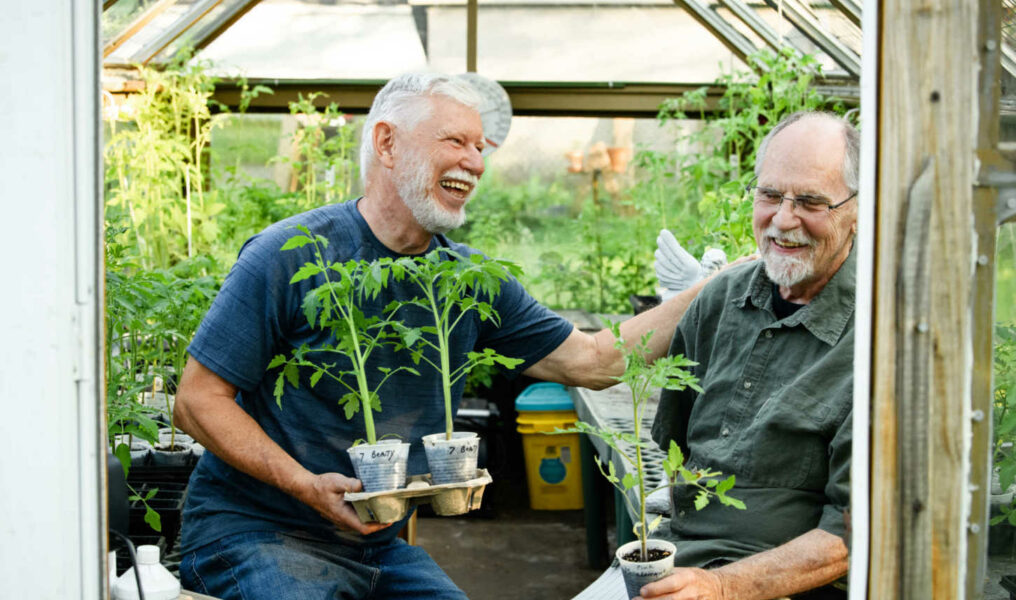On a recent Sunday morning, Joe Rarus stands under a canopy in his yard, surveying the overflow of tomato plants that line the grass outside his greenhouse. There were about 1,200 in all, not including his two experimental offsite test gardens.
For the last 12 years, Joe has sold tomatoes from his home on a quiet street in Southfield, where he lives with Gary Brewer, his partner of 45 years. The business, nicknamed Joematoes, attracts customers from as far as Chicago every season.
"I've never worried about feeding myself," he says, waving his hands toward the countless plants on display. "I'm in the middle of it."
The backyard sales are open for about 11 weeks, beginning in late March through early June. Although Joematoes has closed sales for the season, he still keeps busy with 107 varieties of tomatoes in his test gardens.
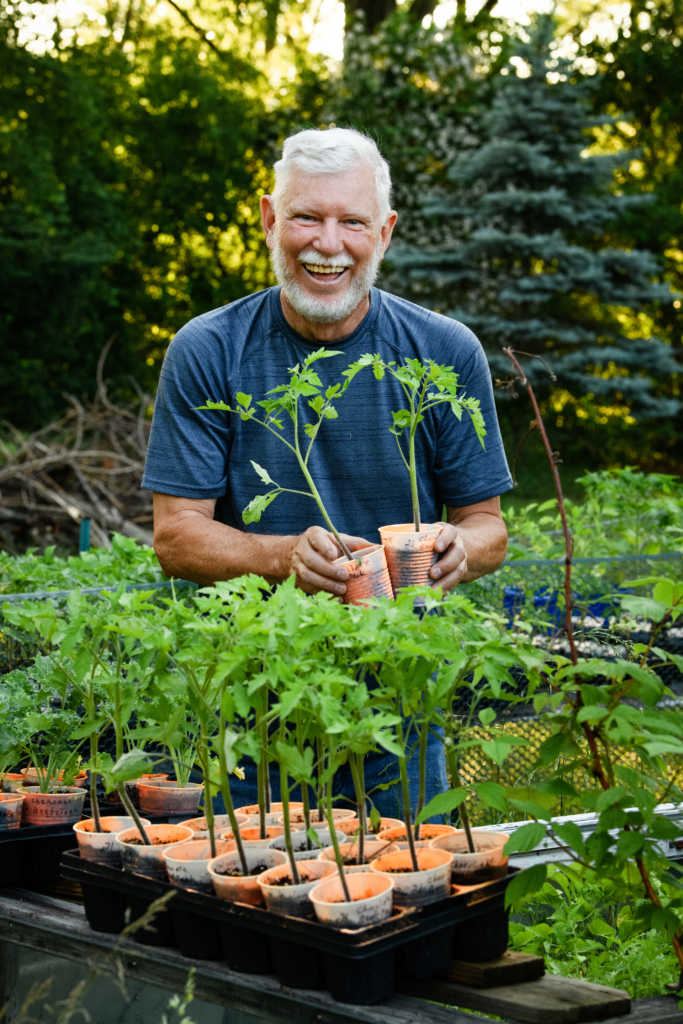
While Joe, 71, always knew his hands were destined to be in dirt, an opportunity to do it professionally appeared mid-career. After spending 20 years working as an inventory and control specialist at Hewlett Packard in Novi, Joe took a job with the City of Southfield as director of its community garden. It's a role he would hold for the next 20 years.
When it comes to eating tomatoes, Joe can't pick just one as his favorite. He's quick to qualify this decision depending on the category and use. But for slicing tomatoes he doesn't even flinch. He will always grab a Chocolate Beefsteak because of its dark red flesh and rich flavor.
The most misunderstood tomato? The green one, of course. "It takes a long time to convince people to just try it. When it's rock hard, it's not ripe. But when it gives just a little bit," he says, demonstrating by gently squeezing his fingers, "or changes on the bottom from green to a light green, then it's ripe."
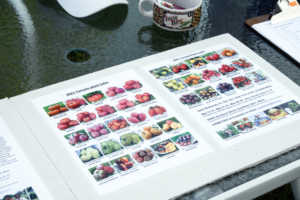
In the years Joe has sold the plants, he's never run out of inventory. In fact, at the end of his sale season, he donates what's left — last year giving 340 plants to the local Salvation Army. "They were gone in an hour-and-a-half," he says, as he straightens opaque plastic drinking cups, each holding a seedling about 10 inches tall. This year he decided to forego donating leftover plants, and he grew a large crop just for the Salvation Army.
On this sunny afternoon, as Joe welcomes prospective customers to his yard, he calls Gary over to take a group photo. "OK, get comfortable. … I'm going to take a few," he says, waving his hand as he urges everyone to squeeze in the frame. Afterward, Gary offers the visitors a black-and-white sticker that in part says: "All People Are Created Equal Members of the One Human Family."
"It's phenomenal. These people are coming here, and they just swear by his tomatoes," Gary says, then turns to flash a huge smile at Joe.
As for growing tomatoes, Gary has no interest. "I'm not into gardening. I'm into cooking for him, and making sure he's fed." His go-to dish? Spaghetti sauce, using Joe's paste tomatoes.
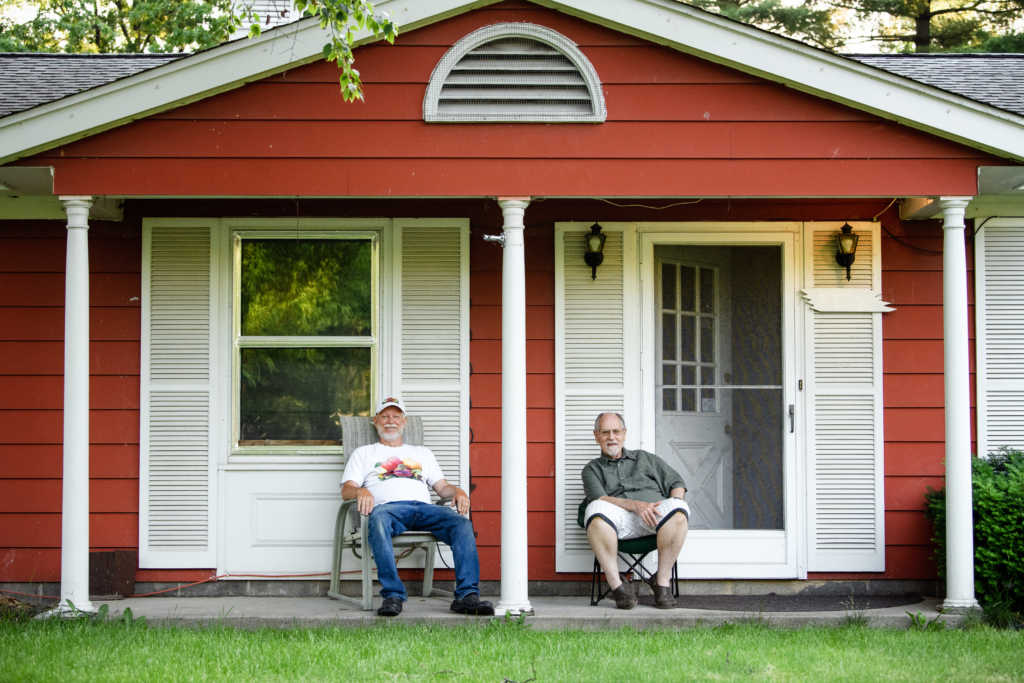
Joe and Gary met in the 1970s at longtime gay nightspot Menjo's on West McNichols Road in Highland Park. It was love at first sight, and shortly after the two moved in with each other.
Gary remembers early in their relationship when then-rising pop star and gay icon Madonna made a surprise appearance at the popular club.
"They held all the parking away from the front of the building and she arrived in a white limo. We didn't know Menjo's was one of her hangouts. Then all of the sudden, the DJ came on and said, 'We have a guest arriving.'"
"And it was Madonna. We were all so excited."
Over the years, Joe and Gary's work lives also crossed as they both spent time working for Hewlett Packard, and later for the Department of Parks and Recreation in Southfield. Last year, Joe retired from the city and devoted even more time to tomatoes.
Joe's devotion reveals itself in his yard, where two laminated 8-1/2-by-11-inch sheets lay in the sun. They present the current menu of what's available at Joematoes, 40 varieties in all. Each item features a photo and description of the color and size ("large red," "medium pink," "green when ripe") along with variety ("Brad's Atomic Grape," "Little Lucky," "David's Pink").
But getting to this point takes planning — and making room on his kitchen table.
"You should see it … our kitchen is disrupted when he does that because he has them all stacked in trays and under the lights when they start growing," Gary says, offering to give a quick look at what's left after the earlier inside-growing efforts. He gets his kitchen back once the plants start getting to a certain size, and then they are transplanted into a cup for eventual sale at $4 each.
Joe's gardens weren't always dominated by tomatoes. In fact, he found his first true passion in bonsai trees (an ornamental tree grown in small containers). So much so, he "had bonsai everywhere."
"When I do a project, I jump in two feet first," Joe says.
After his love affair with bonsai, he took a liking to roses and before long had 263 rose bushes growing in containers behind his ranch home. But Joe's heart and hands wanted to dig deeper. Maple tree roots prevented him from growing a proper garden out back, and that's when he connected with the Southfield Community Garden.
It was here, about 20 years ago, that Joe turned his gardening gaze to tomatoes. He already knew he could grow things. So he decided to buy a pack of seeds for a couple bucks on eBay to introduce to his crop at the community garden.
"I thought, yeah. I can do that."
And Joe sure did.
As the plants popped out of the ground, one caught his eye. "I was like, 'Who are you, little lone star over there?' It was called a Black Tomato; it's not black but a dark, dark red. I told myself: 'I like that, I want the name of that.'" In the next year Joe gathered catalogs, bought every kind of Black Tomato seed available and then grew them all. After a while he saw none of the tomatoes in his test garden matched that first Black Tomato. "That's when I realized I like this," and he started breeding and hybridizing his own plants.
Joe found fellowship in online groups like Tomatoville.com, where he chats with other gardeners about growing techniques, shares pictures and swaps seeds. "That's how I was able to get these unique varieties," he says.
Eventually people began to notice. He won enough ribbons to fill a shoe box and received honors twice at the Michigan State Fair. But Joe doesn't let these accolades go to this head. He's got a garden to tend. A garden that brings folks like Mary Malosh and her daughter Kiffi Ford all the way out from East Lansing.
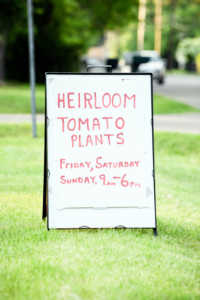
Recently, the two took a long Sunday drive in search of heirloom tomato plants.
"We were going to grow them from seed," Mary says. Until Kiffi found out about the Joematoes Facebook page from a friend.
The two ate their first heirloom tomatoes this past winter and were so impressed with the rich flavor they set out on a mission to plant their own garden. "We are addicted to the heirloom tomatoes," Kiffi says, with a smile.
Mary and Kiffi say they didn't think twice about driving to Metro Detroit.
"It seems like Joe is really passionate and committed to producing wonderful tomatoes," Kiffi says. "And it's clear that he cares a lot. That's enough inspiration to put us on the road driving almost a couple hundred miles."
As the women gather their 21 plants, Joe gives them advice on how to properly plant them.
"You'll want to throw a handful of sugar in with the dirt," Joe tells them, and offers tips about the benefits of using crunched up Tums and Epsom salts in the process.
The cherry tomatoes need to be planted 3 feet apart, he says. "Even though a cherry (tomato) is small, don't think small cherries, small plant. It will be this big," he says, reaching up above his head.
"OK, Mom," Kiffi says, lifting a box of Joematoes plant selections. "Did we bite off more than we can chew?"
"Don't worry," Joe assures them. "Sit back and they'll tell you what to do."
